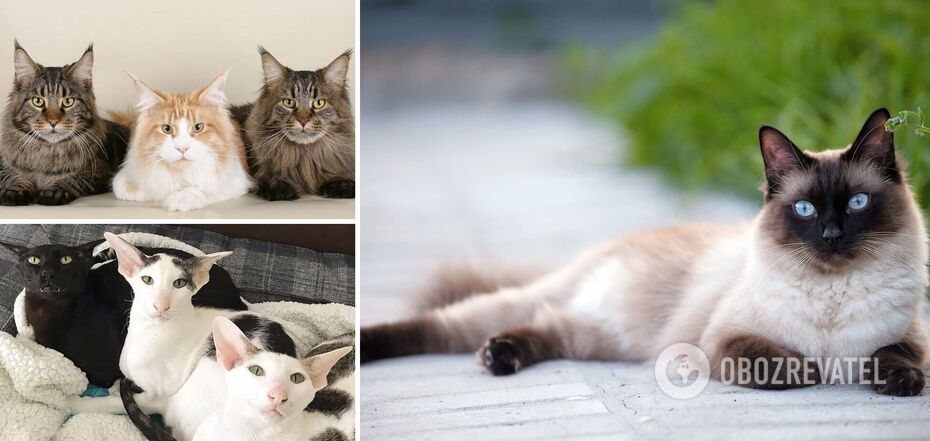Life
How long do cats live: which breeds are long-lived
The well-being and health of a pet is the main responsibility of its owner. With proper care, domestic cats can live for 15 years or more. But is there a dependence of the feline's life expectancy on its breed?
As OBOZREVATEL has found out, felinologists do distinguish several long-lived breeds. As a rule, these are long-established breeds or new species bred with the help of wild cats. This is because high-breed animals are usually bred through inbreeding, which increases the risk of disease. But what other reasons, apart from genes, can affect a cat's life expectancy?
What affects a cat's life expectancy
First of all, it is the conditions of detention. A cat that lives at home does not meet stray dogs and does not run across the road, so it has much less risks in life. Unfortunately, the life expectancy of street cats is very short, only 2-5 years, and animals that walk on the street without supervision live less than their relatives. The cats that live the longest are those that are not let out or are walked like dogs - with the participation of their owners.
Nutrition is also important. Modern foods take into account all the needs and characteristics of cats: kittens and lactating cats are given more nutrients, neutered and elderly animals are offered a lower-calorie diet, and there are entire lines of dietary foods for cats with various diseases. Of course, feeding your cat natural meat is also a great approach, although it requires some effort. But in this case, consult your veterinarian to help you balance your cat's diet, because unlike dogs, cats are obligate carnivores, and the percentage of non-meat products in their diet should be very small. In addition, you need to give them offal from time to time and process everything properly so as not to infect your pet with parasites and protozoa. It is also important not to overfeed your furry friend - being overweight is just as harmful to cats as it is to humans.
Medical care is another very important factor. Once a year, a cat, even one that does not leave the house, should receive all the necessary vaccinations. Routine check-ups - examinations, blood tests, etc. - should be carried out with the same frequency. And don't forget about regular parasite treatment. Also consider the typical problems of different breeds. For example, Maine Coons and British Longhairs often have heart problems, the former also suffer from musculoskeletal diseases, bald cats have extremely sensitive skin, exotic cats have a weak respiratory system and eyes, and so on. Study this issue and keep it under control.
Do not forget about the animal's physical activity. Despite the fact that cats like to lie down for a long time and sleep most of the day, they still need exercise. With age, this need decreases, but even elderly animals are happy to chase a waving stick or a crumpled piece of paper for at least a couple of minutes. It is your responsibility to ensure that your pet leads an active life.
It is also important to regulate the level of stress. Cats are psychologically sensitive animals and do not tolerate stressful situations. Moving, the arrival of guests, the long absence of a loved one, conflicts with family members, and even a vacuum cleaner that is switched on can have a bad effect on the health of the furry animal. Therefore, take into account its character - do not bother a cat that is not in the mood for communication, do not even pet it unless it initiates it, provide the animal with at least one place for complete privacy, and in no case take it out of its hiding place. Avoid bathing your furry friend unnecessarily - this is also incredibly stressful for him. Also, do not scare cats for fun. It's funny for you, but it takes years of life from the animal.
Which breeds live longer than others
As a rule, outbred cats can boast of good health. These animals mostly inherit the strongest genes from their parents and are therefore hardy and strong creatures. So don't be afraid to adopt ordinary "sprats", "shells" and black and white fluffy cats from shelters. They often have a great disposition to everything.
But here are the breeds that are considered to be real long-livers:
- Siamese and most of its derivatives, Russian Blue, Oriental, and Semi-Persian cats - 19-20 years old;
- Thai, Egyptian Mau - 18-19 years;
- Minsk tailless, Japanese bobtail, Savannah, Selkirk Rex - 17-18 years old;
- Maine Coon, Australian Smoky, Celtic - 16 years old;
- Neva Masquerade, Abyssinian, British, Burmese - 14-16 years old;
- Sphynx, Himalayan, Cimrian, Persian - 12-14 years old;
- Scottish Straight, Munchkin, Ural Rex - 9-11 years old;
- Bombay - 8-10 years old.
Earlier OBOZREVATEL told what breeds of cats will become the best doctors and how they can help their people.
Subscribe to OBOZREVATEL's Telegram and Viber channels to keep up with the latest news.



























